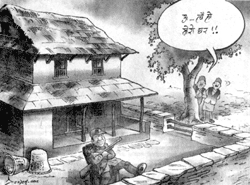 The peace process has been on for four months now. The 12-point agreement between the seven-party alliance and the Maoists reassured the people that the movement would successfully bring down the authoritarian rule of the king and reinstate full democracy. It was the people's struggle that eventually brought King Gyanendra to his knees on 24 April.
The peace process has been on for four months now. The 12-point agreement between the seven-party alliance and the Maoists reassured the people that the movement would successfully bring down the authoritarian rule of the king and reinstate full democracy. It was the people's struggle that eventually brought King Gyanendra to his knees on 24 April.
The government formed through the 'People's Movement' and the restored parliament now faces the challenge and responsibility of bringing lasting peace. The parliament's declaration on 18 May extensively cut down the king's power, and transferred it instead to the prime minister and the parliamentary speaker.
Then the political parties and the Maoists declared ceasefires, formed committees, signed a code of conduct, the 8-point agreement, and formed the interim constitution draft committee.
Now for any peace process to work, there has to be trust between the people and the leadership. And this trust can only be built if there is coordination between the most rural areas, various government departments, and if problems of the conflict victims are addressed. Ignoring the wounds of the conflict and trying to establish peace through the upper levels of power alone will be like building castles in the sand.
A proper base so that the peace process can move forward has not been built. The state's presence is only felt in the cities, there is none in rural areas. This has deprived the rural population of security and other services that the state should provide. They cannot trust the peace process because there are 'two governments' within the state.
Murder, rape, and looting are rampant in rural areas but the state has remained unresponsive. There are already more than 50 points that the seven-party alliance and the Maoists have agreed to, but nothing has been implemented. The committee formed to monitor the ceasefire is insignificant as both the government and the Maoists have been repeatedly violating the code of conduct. If the parties do not address the people's immediate problems, the peace process may stall. Leaders may debate on democracy and peace inside Singha Darbar, but unless the people see a solution to their problems, public frustration is likely to explode. If that happens, no one can say for sure what turn the country will take.


